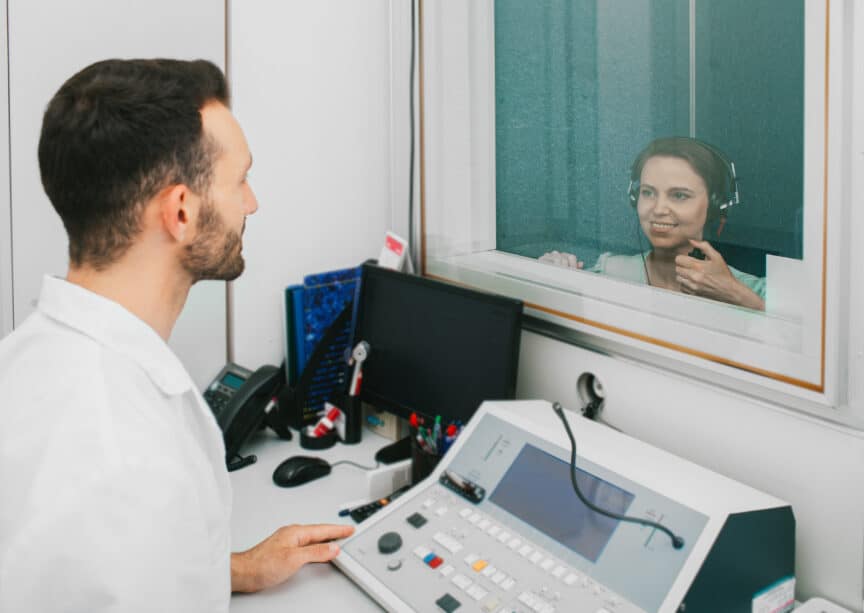- How to Care for Infants With Hearing Loss - April 15, 2024
- Hearing Aid Tips for Runners - April 5, 2024
- Overcoming Misconceptions Around Hearing Aids - March 27, 2024
Do you have hearing loss? It’s all too common to have it for years without even realizing it is even an issue. This is in part because it can often develop gradually over time in the form of subtle syllables in words, pitches, or tones. People may refer to sounds such as an oven alarm or doorbell that you just can’t hear. However, even when you start to get the clues that a hearing loss may be present it often goes undiagnosed due to the power of denial. In fact, most people wait seven to ten years from the time they start to suspect they have a hearing loss to take steps to address the problem.
Many people don’t want to admit that they have a hearing loss because they fear the cost or worry that it means they are growing older. While it’s true that hearing loss is more common as we age, it can happen to anyone at any time. The important thing is to address hearing loss before it becomes a more serious issue.
The Dangers of Untreated Hearing Loss
For years people have underestimated the serious nature of hearing loss. Not only is it a communication issue affecting how you connect to people throughout your life at home and in your professional life, but it can affect self-confidence, self-esteem, and likeliness to connect to new people as well as try new things. In its place comes rifts in relationships which are important to you, chronic depression and social isolation.
It also has a significant impact on cognitive health. We collect sounds with our ear but the process of sound is not completed until the sounds arrive in our brain. Our ears achieve this via tiny hair-like cells called stereocilia which convert soundwaves into electrical impulses which are interpreted within the auditory cortex of our brain. Hearing loss occurs when the stereocilia are damaged, inhibiting some sounds, tones, and pitches from reaching the brain. This causes us to fill in the blanks during conversation and can not only be frustrating and exhausting but can contribute to cognitive decline. Even a slight hearing loss can cause people to test lower on cognitive tests in comparison to those with normal hearing. However the more severe the hearing loss the greater the risk of developing Alzheimer’s Disease or other forms of dementia.
How Often Should You Have a Hearing Test?
The good news is that while hearing loss is a permanent condition, it can be addressed effectively in most cases using hearing aids. They can be programmed specifically for your individual hearing needs based on your latest audiogram. So how often do you need to test to stay on top of hearing loss? Well, that differs depending upon a few factors.
Knowing the Signs of Hearing Loss
Most people should test their hearing every ten years unless you notice a significant issue with hearing or communication. Because it’s often hard to self-diagnose and simple home screening or questionnaire will help you rule out or add suspicion to whether you have a hearing problem that should be tested. Some common symptoms of hearing loss include:
- You struggle to follow conversations, especially in noisy places where more than one person is speaking.
- You ask people to repeat themselves frequently
- Voices sound muffled
- You turn the telephone or television up all the way and still struggle to hear it.
- You experience ringing in the ears (tinnitus)
50 and Beyond
If you’ve experienced any of these signs at any age it’s important to take it seriously and schedule a hearing exam. However, once you turn 50, the risk of hearing loss spikes significantly. Age related hearing loss occurs as the stereocilia become more fragile as we age, making you more prone to breakage of the cells. Especially if you have a family history of hearing loss it’s important to start planning to test your hearing for any significant change every three years. Presbycusis, the technical term for age related hearing loss, is genetic so it is important to take it seriously.
Schedule Your Next Hearing Exam Now!
Even if you’ve had hearing loss for years, it’s never too late to make a change and address your hearing loss. Take the leap and find out what we can do to improve the quality of your life every day with hearing aids.

